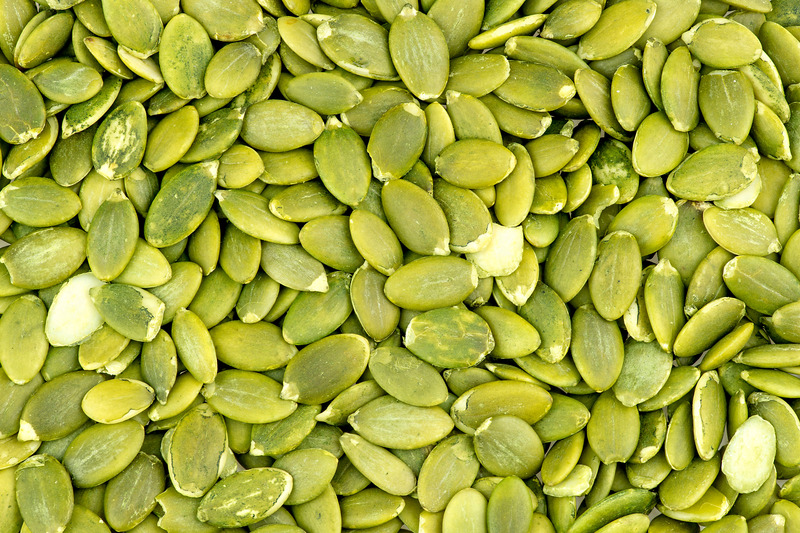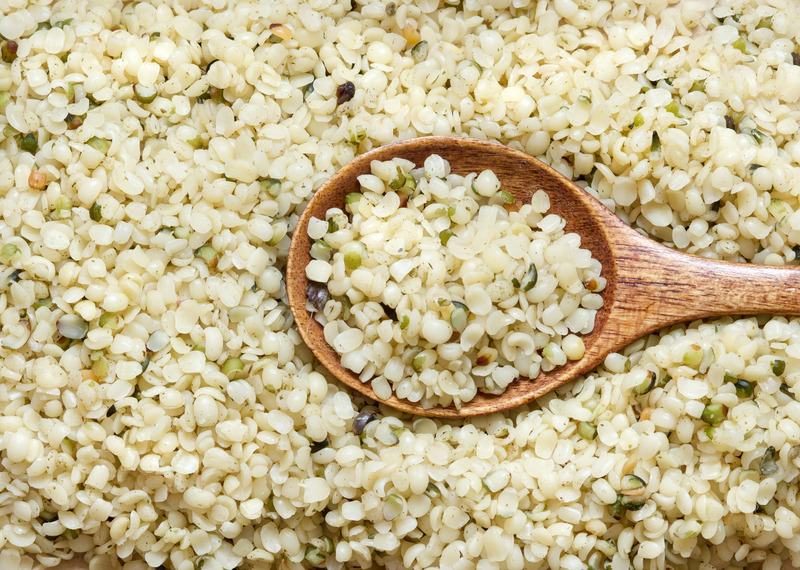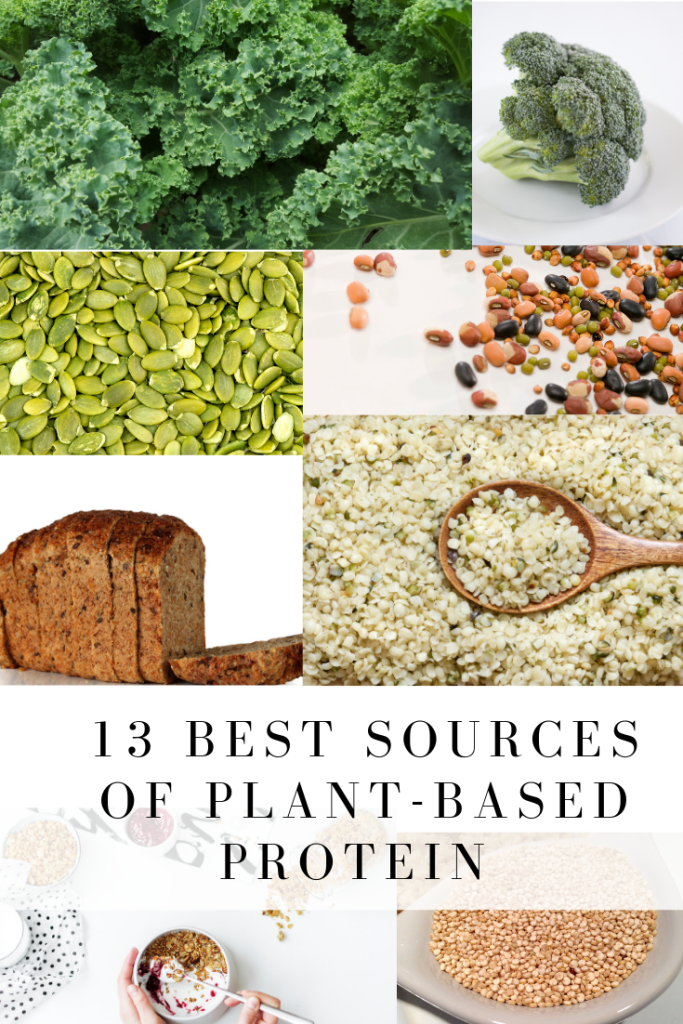Have you heard the term “plant-based diet” but not sure what that means or what it means to you? Here you’ll learn what a plant-based diet is, the 13 best sources of plant-based protein and get ideas for some plant-based dinner recipes!

What is a plant-based diet?
A plant-based diet is actually not a diet at all. Eating plant-based is more of a lifestyle or an opportunity to better your personal diet, which is exactly why I like it! It does not emphasize eliminating anything from your diet (yes, you can still eat meat if that’s how you choose to follow it!), but rather encourage incorporating more whole foods like vegetables, fruits, whole grains, legumes, seeds and nuts. Plant-based protein comes from things like vegetables, legumes, nuts and seeds, which yes do contain protein that can help you meet your daily needs.
Being “plant-based” different from being vegan or vegetarian because you can still incorporate meat on a plant-based diet, unlike vegan and vegetarian diets. All three diets emphasize whole foods, and a wide variety of fruits, vegetables, nuts, seeds and grains. Eggs are allowed on a plant-based diet whereas they are not on a vegan diet and on some vegetarian diets.
There are definitely differing opinions and interpretations on the definition of plant-based. Some people practice predominantly plant-based eating which can mean eating meat is rare, and for others like me it means adding more sources of plant-based protein into the diet and opting for meatless dishes a few times a week.

Top 13 Best Sources of Plant-Based Protein
Getting protein is easier than you may think when you’re not eating meat all of the time. Trust me, as someone who used to think that they had to eat meat in order to feel full, you can have a filling, satisfying and protein-packed meal without meat or fish! Here are 13 best sources of plant-based protein:
- Quinoa – Quinoa is actually not a grain, but rather a seed! That’s why you’ll see it referred to as a “pseudo-grain”. Quinoa is packed with health benefits and 8 grams of protein per cup. It contains all 9 essential amino acids your body needs to build protein, making it a complete source of protein.
- Pumpkin seeds – Pumpkin seeds are as versatile of a protein source as they come. Sprinkle them on salads, and grain bowls (1 cup provides 12 grams of protein!) or opt for a Health Warrior pumpkin seed bar when you’re on-the-go for 8 grams of plant-based protein.
- Hemp Seeds – Hemp seeds are also super versatile and contain 10 grams of plant-based protein per 3 tbsp. Serving (that’s more than flax seeds and chia seeds!). They also contain healthy omega-3 & 6 fatty acids plus crucial minerals like magnesium, manganese and zinc Sprinkle them on yogurt, oatmeal, or my personal favorite way of eating them, which is mixing them into creamy peanut butter for a crunch.
- Chia Seeds – Chia seeds are super nutrient dense and contain 4 grams of protein per 1 ounce serving, as well as 11 grams of fiber–both will help to keep you full! Sprinkle them on literally anything and be sure to also check out Health Warrior chia seed bars too.
- Oats – oat (and gluten free oats too!) provide 6 grams of protein per ½ cup. Bonus here is that they are also a good source of fiber, with 4 grams per serving. Experts recommend eating 25-38 grams of fiber per day, but unfortunately most of us are not getting enough!
- Lentils– Part of the pulse family, lentils contain 9 grams of plant-based protein per 1/2 cup. Lentils are easy to cook and add texture to any dish you add them too.
- Chickpeas – Another member of the pulse family, chickpeas, as known as garbanzo beans, are high in plant-based protein (7 grams per 1/2 cup serving) and can even be used in gluten free dessert recipes like this one (p.s. it involves pumpkin too!)
- Kale – Kale is one of the vegetables with the highest amount of protein, coming in at 3 grams per cup. This leafy green boasts lots of healthy benefits like vitamin C, K, and A.
- Broccoli– Broccoli is another veggie that is higher in protein than you may think, with 4.2 grams of protein and 50 calories per cup. To be honest, I’m not a huge broccoli fan but I do like it riced like in these beef and broccoli rice bowls!
- Nutritional Yeast – You may have seen these yellow flakes in a jar and wondered what they actually are. Nutritional yeast has a nutty, cheesy flavor and is used in place of cheese in a lot of vegan and vegetarian dishes. It has 14 grams of protein and 7 grams of fiber per ounce, plus is a good source of B vitamins. If you’re plant-based or not, this is a great “seasoning” to have at home and sprinkle on to salads and more!
- Peanut butter & almond butter – Nut butter is a personal favorite of mine, and can be used a snack or in sauces like in the recipes below. A 2 tbsp serving comes in at 3 grams of protein, just make sure you are opting for peanut butter or almond butter without added sugars.
- Sprouted Grain Bread – Bread like Ezekiel bread that is made from sprouted grains and legumes is a good source of plant-based protein, with about 8 grams per serving. Sprouting grains and legumes increases the amount of healthy nutrients they contain and reduces the amount of anti-nutrients in them (things that hinder our absorption of certain nutrients). You can also find sprouted quinoa in your grocery store too.
- Spirulina – Maybe you’ve heard of this blue-green algae in protein powders and green smoothies, but did you know it’s also a good source of protein? Two tablespoons contains 8 grams of protein and other important nutrients like copper, magnesium and potassium.

Plant Based Recipes
- Kale Black Bean Tacos
- Spaghetti Squash Pad Thai
- Kale Farro Blackberry Salad
- Butternut Squash Quinoa Chili
- Zoodle Stuffed Peppers with Quinoa
- Zucchini Lasagna with Quinoa
- Kale cauli power breakfast bowls
- Pumpkin Ginger Bisque
Plant Based Protein Powders
Looking for a protein powder that does not contain whey? Here are 17 best registered dietitian approved plant based protein powders. My personal favorite are these two. One is pea protein based and one is not.
Vegan Protein Powder With Pea Protein
Vegan Protein Powder Without Pea Protein
- Health Warrior Superfood Protein Powder (pumpkin seed based with added probiotics!)

Plant Based Diet Benefits
Adopting a plant-based way of eating can help you to try new foods that you haven’t before, get more fiber on a daily basis and lower your risk for chronic diseases.
Increased Fiber Intake
Most of us are not getting enough fiber, but things like grains, fruits and vegetables and pulses (beans, legumes, chickpeas, dry peas) are all good sources of fiber. Adding more fiber to our diets, helps with fullness and satiety on a daily basis, which can help with weight loss, and in the long run contributes to maintaining a healthy digestive system.
The way that I practice a plant-based lifestyle is really also aimed at getting more fiber into my diet overall because I know when my digestion is on point I truly feel better and have more energy!
Reduced Risk for Heart Disease and Cancer
A recent study of over 200,000 people found that those who followed a healthy plant-based diet rich in vegetables, fruits, whole-grains, legumes and nuts had a significantly lower risk of developing heart disease than those following non-plant-based diets.
Studies on the effects of a plant-based diet as it relates to cancer risk have showed that vegetarians* had a decreased risk of developing colorectal cancer and gastrointestinal cancer.
*remember vegetarian means no meat, whereas plant-based can still mean eating meat to some degree.
Greater Variety of Fruits, Vegetables and Grains
Opting for a plant-based meal a couple times a week encourages you to think outside the typical vegetables you may default to. When building a plant-based meal it can be fun to experiment with different grains you’ve never had before and seasonal fruits and veggies too.
Should you be taking any supplements while on a plant-based diet?
When you cut out animal sources of protein you are at greater risk of deficiency for B vitamins, iron, zinc, calcium and vitamin D. There are ways to obtain these vitamins from plants too, for example mushrooms are a good plant source of vitamin D and broccoli is a good source of calcium.
As with starting any lifestyle or diet change, it’s important to notice how you are feeling in leu of those changes. If all of the sudden your energy level plummets, it may be beneficial to get a blood test with you doctor to check your levels and see if supplementation for certain vitamins is needed.
How I Practice a Plant-Based Diet & Lifestyle
I grew up in a household where there was always animal or fish protein on the dinner table. I used to think I wouldn’t stay full if I didn’t eat an animal source of protein with my meals. When I began learning that different sources of protein like beans, grains, nuts and seeds and that some vegetables (hello kale!) actually contain protein too, that mentality shifted away from strictly meat at every meal.
Animal and fish sources of protein will always be in my diet, but it felt freeing to diversify my meals without meat. I knew I was still getting enough protein on days I wasn’t eating meat and that’s how I started dabbling in a more plant focused way of eating.
I do my best to eat a wide range of grains, legumes, fruits, vegetables, nuts and seeds. I don’t stress if I don’t eat meat in a day, and opt for meatless dishes a couple times of week. That is what currently works for me in this stage of life.
Quinoa is a staple at my house, and when all else fails I build a grain bowl packed with veggies, avocado and nuts and seeds to keep me full and satisfied. I always have a Health Warrior pumpkin seed bar in my bag (the honey sea salt is my favorite flavor!) that packs 8 grams of plant-based protein per bar when I’m running around town and need something in between meals. I love reaping the benefits of protein from pumpkin seeds and the other nutrients they contain like iron, magnesium and fiber.
This post was written in sponsorship with Health Warrior, but as always all opinions are my own!
XOXO
MAGGIE MICHALCZYK, REGISTERED DIETITIAN NUTRITIONIST
Pin this post for later!


